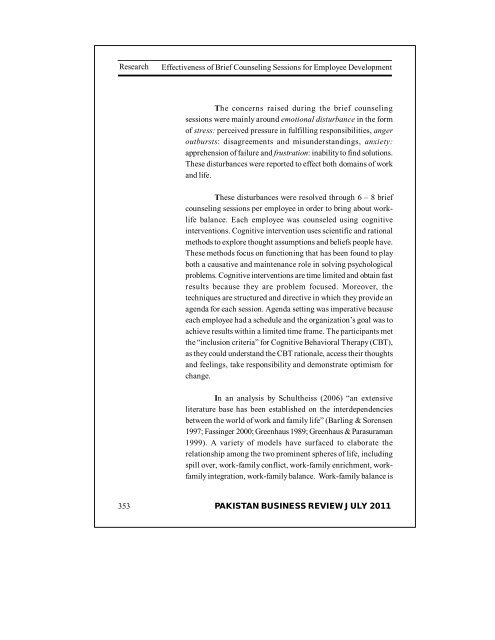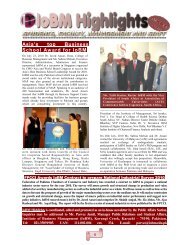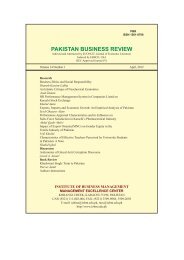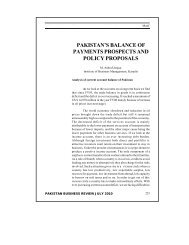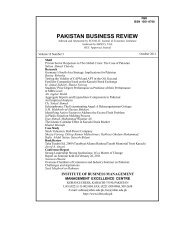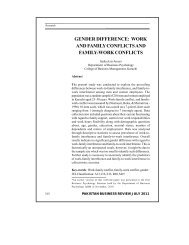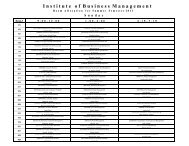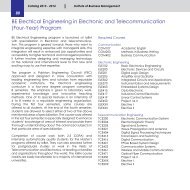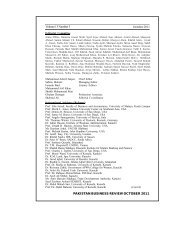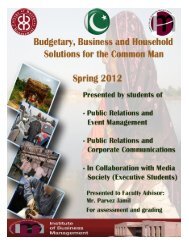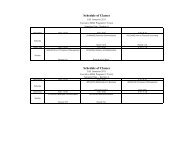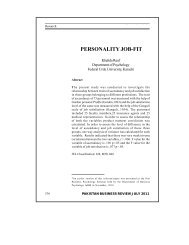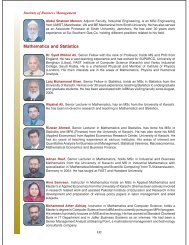PAKISTAN BUSINESS REVIEW - Institute of Business Management
PAKISTAN BUSINESS REVIEW - Institute of Business Management
PAKISTAN BUSINESS REVIEW - Institute of Business Management
Create successful ePaper yourself
Turn your PDF publications into a flip-book with our unique Google optimized e-Paper software.
Research<br />
Effectiveness <strong>of</strong> Brief Counseling Sessions for Employee Development<br />
The concerns raised during the brief counseling<br />
sessions were mainly around emotional disturbance in the form<br />
<strong>of</strong> stress: perceived pressure in fulfilling responsibilities, anger<br />
outbursts: disagreements and misunderstandings, anxiety:<br />
apprehension <strong>of</strong> failure and frustration: inability to find solutions.<br />
These disturbances were reported to effect both domains <strong>of</strong> work<br />
and life.<br />
These disturbances were resolved through 6 – 8 brief<br />
counseling sessions per employee in order to bring about worklife<br />
balance. Each employee was counseled using cognitive<br />
interventions. Cognitive intervention uses scientific and rational<br />
methods to explore thought assumptions and beliefs people have.<br />
These methods focus on functioning that has been found to play<br />
both a causative and maintenance role in solving psychological<br />
problems. Cognitive interventions are time limited and obtain fast<br />
results because they are problem focused. Moreover, the<br />
techniques are structured and directive in which they provide an<br />
agenda for each session. Agenda setting was imperative because<br />
each employee had a schedule and the organization’s goal was to<br />
achieve results within a limited time frame. The participants met<br />
the “inclusion criteria” for Cognitive Behavioral Therapy (CBT),<br />
as they could understand the CBT rationale, access their thoughts<br />
and feelings, take responsibility and demonstrate optimism for<br />
change.<br />
In an analysis by Schultheiss (2006) “an extensive<br />
literature base has been established on the interdependencies<br />
between the world <strong>of</strong> work and family life” (Barling & Sorensen<br />
1997; Fassinger 2000; Greenhaus 1989; Greenhaus & Parasuraman<br />
1999). A variety <strong>of</strong> models have surfaced to elaborate the<br />
relationship among the two prominent spheres <strong>of</strong> life, including<br />
spill over, work-family conflict, work-family enrichment, workfamily<br />
integration, work-family balance. Work-family balance is<br />
353<br />
<strong>PAKISTAN</strong> <strong>BUSINESS</strong> <strong>REVIEW</strong> JULY 2011


